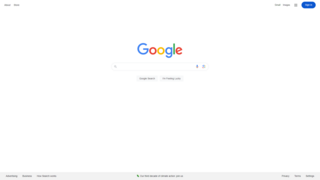
Google Search is a search engine operated by Google. It allows users to search for information on the Internet by entering keywords or phrases. Google Search uses algorithms to analyze and rank websites based on their relevance to the search query. It is the most popular search engine worldwide.

The World Wide Web is an information system that enables content sharing over the Internet through user-friendly ways meant to appeal to users beyond IT specialists and hobbyists. It allows documents and other web resources to be accessed over the Internet according to specific rules of the Hypertext Transfer Protocol (HTTP).
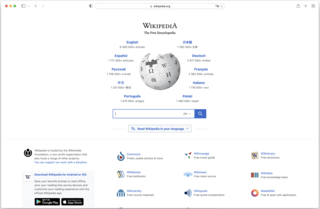
A web browser is an application for accessing websites. When a user requests a web page from a particular website, the browser retrieves its files from a web server and then displays the page on the user's screen. Browsers are used on a range of devices, including desktops, laptops, tablets, and smartphones. In 2020, an estimated 4.9 billion people have used a browser. The most-used browser is Google Chrome, with a 64% global market share on all devices, followed by Safari with 19%.
Search engine optimization (SEO) is the process of improving the quality and quantity of website traffic to a website or a web page from search engines. SEO targets unpaid traffic rather than direct traffic or paid traffic. Unpaid traffic may originate from different kinds of searches, including image search, video search, academic search, news search, and industry-specific vertical search engines.

Alexa Internet, Inc. was an American web traffic analysis company based in San Francisco. It was a wholly-owned subsidiary of Amazon.

Excite is an American website operated by IAC that provides outsourced internet content such as a metasearch engine, with outsourced weather and news content on the main page. As of 2024, all of Excite's operations are controlled by services outside of the business.
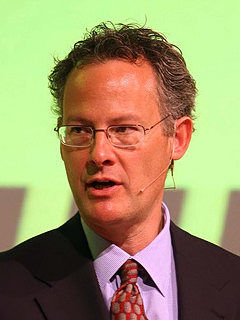
Nicholas G. Carr is an American journalist and writer who has published books and articles on technology, business, and culture. His book The Shallows: What the Internet Is Doing to Our Brains was a finalist for the 2011 Pulitzer Prize in General Nonfiction.

Startpage is a Dutch search engine company that highlights privacy as its distinguishing feature. The website advertises that it allows users to obtain Google Search results while protecting users' privacy by not storing personal information or search data and removing all trackers. Startpage.com also includes an Anonymous View browsing feature that allows users the option to open search results via proxy for increased anonymity.

Lev Manovich is an artist, an author and a theorist of digital culture. He is a Distinguished Professor at the Graduate Center of the City University of New York. Manovich played a key role in creating four new research fields: new media studies (1991-), software studies (2001-), cultural analytics (2007-) and AI aesthetics (2018-). Manovich's current research focuses on generative media, AI culture, digital art, and media theory.
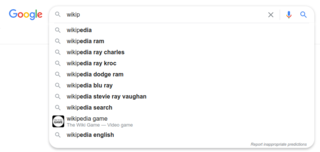
A search engine is a software system that provides hyperlinks to web pages and other relevant information on the Web in response to a user's query. The user inputs a query within a web browser or a mobile app, and the search results are often a list of hyperlinks, accompanied by textual summaries and images. Users also have the option of limiting the search to a specific type of results, such as images, videos, or news.

Friedrich A. Kittler was a literary scholar and a media theorist. His works relate to media, technology, and the military.
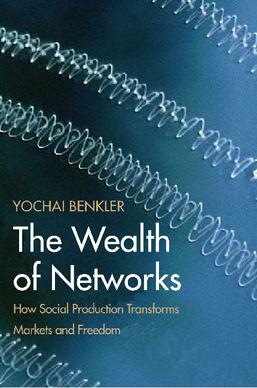
The Wealth of Networks: How Social Production Transforms Markets and Freedom is a book by Harvard Law School professor Yochai Benkler published by Yale University Press on April 3, 2006. The book has been recognized as one of the most influential works of its time concerning the rise and impact of the Internet on the society, particularly in the sphere of economics. It also helped popularize the term Benkler coined few years earlier, the commons-based peer production (CBPP).

A digital library is an online database of digital objects that can include text, still images, audio, video, digital documents, or other digital media formats or a library accessible through the internet. Objects can consist of digitized content like print or photographs, as well as originally produced digital content like word processor files or social media posts. In addition to storing content, digital libraries provide means for organizing, searching, and retrieving the content contained in the collection. Digital libraries can vary immensely in size and scope, and can be maintained by individuals or organizations. The digital content may be stored locally, or accessed remotely via computer networks. These information retrieval systems are able to exchange information with each other through interoperability and sustainability.

Is Google Making Us Stupid? What the Internet Is Doing to Our Brains! is a magazine article by technology writer Nicholas G. Carr, and is highly critical of the Internet's effect on cognition. It was published in the July/August 2008 edition of The Atlantic magazine as a six-page cover story. Carr's main argument is that the Internet might have detrimental effects on cognition that diminish the capacity for concentration and contemplation. Despite the title, the article is not specifically targeted at Google, but more at the cognitive impact of the Internet and World Wide Web. Carr expanded his argument in The Shallows: What the Internet Is Doing to Our Brains, a book published by W. W. Norton in June 2010.
Hartmut Geerken was a German musician, composer, writer, journalist, playwright, and filmmaker.

Googlization is a neologism that describes the expansion of Google's search technologies and aesthetics into more markets, web applications, and contexts, including traditional institutions such as the library. The rapid rise of search media, particularly Google, is part of new media history and draws attention to issues of access and to relationships between commercial interests and media.
Information technology (IT) is a set of related fields that encompass computer systems, software, programming languages, and data and information processing, and storage. IT forms part of information and communications technology (ICT). An information technology system is generally an information system, a communications system, or, more specifically speaking, a computer system — including all hardware, software, and peripheral equipment — operated by a limited group of IT users, and an IT project usually refers to the commissioning and implementation of an IT system. IT systems play a vital role in facilitating efficient data management, enhancing communication networks, and supporting organizational processes across various industries. Successful IT projects require meticulous planning, seamless integration, and ongoing maintenance to ensure optimal functionality and alignment with organizational objectives.

Stephan Spencer is a three-time author under the O'Reilly Media brand, search engine optimization (SEO) expert, inventor, podcaster, speaker, and founder of Netconcepts.
Ulrich Müller is a German chemist that is known for his works on solid-state chemistry and the application of crystallographic group theory to crystal chemistry. He is the author of several textbooks on chemistry, solid-state chemistry, and crystallography.

Berlin Connection is a 1998 German educational adventure game by eku interactive that was released for Mac and Windows.















